Akrotiri and Dhekelia
The Sovereign Base Areas of Akrotiri and Dhekelia[2] (abbr. SBA; Greek: Περιοχές Κυρίαρχων Βάσεων Ακρωτηρίου και Δεκέλιας, Periochés Kyríarchon Váseon Akrotiríou ke Dekélias; Turkish: Egemen Üs Bölgeleri Ağrotur ve Dikelya) is a British Overseas Territory on the island country of Cyprus. The areas, which include British military bases and installations, as well as other land, were retained by the British under the 1960 treaty of independence, signed by the United Kingdom, Greece, Turkey and representatives from the Greek and Turkish Cypriot communities, which granted independence to the Crown colony of Cyprus. The territory serves an important role as a station for signals intelligence and provides a vital strategic part of the United Kingdom communications gathering and monitoring network in the Mediterranean and the Middle East.[3][4] Following UK permission, the United States was given a limited, short-term presence on the British bases between 2013 and 2017.[5]
Akrotiri and Dhekelia | |
|---|---|
| Sovereign Base Areas of Akrotiri and Dhekelia | |
.svg.png) Coat of arms | |
| Anthem: "God Save the Queen" | |
 Location of Akrotiri and Dhekelia (red) | |
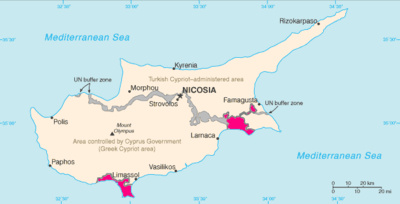 Location of Akrotiri and Dhekelia (pink) on Cyprus (pink, gray, and beige) | |
| Sovereign state | United Kingdom |
| Treaty of Establishment | 16 August 1960 |
| Capital | Episkopi |
| Largest civilian settlement | Akrotiri |
| Official languages | English |
| Common languages | |
| Government | De facto stratocratic dependency under a constitutional monarchy |
• Monarch | Elizabeth II |
• Administrator | Major-General Robert Thomson ex officio |
| Government of the United Kingdom | |
• Minister | Christopher Pincher |
| Area | |
• Total | 254 km2 (98 sq mi) |
| Population | |
• 2011 estimate | 15,700[1] |
| Currency | Euro (€) (EUR) |
| Time zone | UTC+02:00 (EET) |
| UTC+03:00 (EEST) | |
| Driving side | left |
| Calling code | +357 |
| UK postcode | BFPO 57 / BF1 2AT (Akrotiri) BFPO 58 / BF1 2AU (Dhekelia) |
History

The Sovereign Base Areas were created in 1960 by the London and Zurich Agreements, when Cyprus achieved independence from the British Empire. The United Kingdom desired to retain sovereignty over these areas, as this guaranteed the use of UK military bases on Cyprus, including RAF Akrotiri, and a garrison of the British Army. The importance of the bases to the British is based on the strategic location of the island, at the eastern edge of the Mediterranean, close to the Suez Canal and the Middle East; the ability to use the RAF base as staging post for military aircraft; and for training.

In July and August 1961, there was a series of bomb-attacks against the pipeline carrying fresh water to the Dhekelia Sovereign Base Area.[6] The pipeline was breached by explosions twelve times.[7]
In 1974, following a military coup by the Cypriot National Guard attempting to achieve enosis (union with Greece), Turkey invaded the north of Cyprus, leading to the establishment of the internationally unrecognised Turkish Republic of Northern Cyprus. This did not affect the status of the bases. Greek Cypriots fleeing from the Turkish forces were permitted to travel through the Dhekelia Sovereign Base Area and were given humanitarian aid, with those from Achna setting up a new village (Dasaki Achnas or Achna Forest) which is still in the Dhekelia Sovereign Base Area.[8] The Turkish advance halted when it reached the edge of the Dhekelia Sovereign Base Area to avoid military conflict with the United Kingdom. In the Akrotiri Sovereign Base Area a tented refugee camp was set up at "Happy Valley" (part of the Episkopi Cantonment)[9] to house Turkish Cypriots fleeing from Limassol and the villages surrounding the Area, until in 1975 they were flown out of RAF Akrotiri via Turkey to northern Cyprus.[10] Some Greek Cypriot refugees remain housed on land in the parts of Trachoni[11] and Kolossi[12] villages that fall within the Akrotiri Sovereign Base Area.[13]
Politics
Current status
The territory is composed of two Base Areas. One is Akrotiri (Greek: Ακρωτήρι pronounced [akroˈtiri]; Turkish: Ağrotur Turkish pronunciation: [ˈaːɾotuɾ]), or the Western Sovereign Base Area (WSBA), which includes two main bases at RAF Akrotiri and Episkopi, plus all of Akrotiri Village's district (including Limassol Salt Lake) and parts of eleven other village districts.[14] The other area is Dhekelia Cantonment (Δεκέλεια Greek pronunciation: [ðeˈceʎa]; Dikelya), or the Eastern Sovereign Base Area (ESBA), which includes a base at Ayios Nikolaos plus parts of twelve village districts.[15]
Ayios Nikolaos Station, in the ESBA, is an ELINT (electronic intelligence) listening station of the UKUSA Agreement intelligence network.[16] The UKUSA signals intelligence system is sometimes known as "ECHELON".[17]
Governance
The SBAs were retained in 1960 to keep military bases in areas under British sovereignty, along with the rights retained to use other sites in what became the territory of the Republic.[18] That makes them different from the other remaining British Overseas Territories, except for the British Indian Ocean Territory which was similarly carved out of a former colony as a site for a military base, although in that case the base was to be used by the United States and the inhabitants (Chagossians) were all removed.
The basic philosophy of their administration was declared by the British government in Appendix O to the 1960 treaty with Cyprus, which provided that the British government intended:
- Not to develop the Sovereign Base Areas for other than military purposes.
- Not to set up and administer "colonies".
- Not to create customs posts or other frontier barriers between the Sovereign Base Areas and the Republic.
- Not to set up or permit the establishment of civilian commercial or industrial enterprises except insofar as these are connected with military requirements, and not otherwise to impair the economic, commercial or industrial unity and life of the Island.
- Not to establish commercial or civilian seaports or airports.
- Not to allow new settlement of people in the Sovereign Base Areas other than for temporary purposes.
- Not to expropriate private property within the Sovereign Base Areas except for military purposes on payment of fair compensation.[19][20]
Appendix O also provides that various ancient monuments in the SBAs (in particular the site and remains of Kourion, the Sanctuary of Apollo Hylates near Kourion, the Stadium of Curium and the Church and remains of the Holy Monastery of St Nicholas of the Cats) should be administered by the Republic of Cyprus. The Cypriot government issues licences for antiquity excavation in the SBAs subject to British consent, and any movable antiquities found in excavations or otherwise discovered become Cypriot state property.[20]
According to the British Ministry of Defence:
Because the SBAs are primarily required as military bases and not ordinary dependent territories, the Administration reports to the Ministry of Defence in London. It has no formal connection with the Foreign and Commonwealth Office or the British High Commission in Nicosia, although there are close informal links with both offices on policy matters.[21]
The territory is administered by an Administrator who is also the Commander of British Forces Cyprus, which as of February 2017 has been Major-General James Illingworth.[22] The Administrator is officially appointed by the British monarch on the advice of the Ministry of Defence. The Administrator has all the executive and legislative authority of a governor of an overseas territory. A Chief Officer is appointed, and is responsible to the Administrator for the day-to-day running of the civil government, with subordinate Area Officers responsible for the civil administration of the two areas. No elections are held in the territory, although British citizens are normally entitled to vote in United Kingdom elections (as British Forces or overseas electors).
The areas have their own legal system, distinct from the United Kingdom and the Republic of Cyprus. This consists of the laws of the Colony of Cyprus as of August 1960, amended as necessary. The laws of Akrotiri and Dhekelia are closely aligned with, and in some cases identical to, the laws operating within the Republic of Cyprus.[23] The Court of the Sovereign Base Areas is concerned with non-military offences committed by any person within Akrotiri and Dhekelia, and law and order is maintained by the Sovereign Base Areas Police, while offences involving British Forces Cyprus and military law are dealt with by the Cyprus Joint Police Unit. Fire and rescue services are provided by the Defence Fire and Risk Management Organisation through stations at Episkopi, Akrotiri, Dhekelia and Ayios Nikolayos. The Defence Medical Services provide emergency ambulance cover based from medical centres in the main bases. All emergency services are accessible from any telephone using the Europe-wide emergency number 112.
Reviews
In January 2010, a newspaper article appeared in the British press claiming that as a result of budgetary constraints arising from the Great Recession, the British Ministry of Defence drew up controversial plans to withdraw the United Kingdom's 3,000 strong garrison and end the use of Cyprus as a staging point for ground forces.[24] The Labour government under whom the proposal appeared was replaced by the Cameron–Clegg coalition and their defence review did not mention the issue.
On 15 December 2012 in a written statement to the House of Commons, the UK's Secretary of State for Defence, Philip Hammond, revealed the findings of a report on the SBA military bases following the completion of a review of their operations by Lord Ashcroft:
The Sovereign Base areas are in a region of geo-political importance and high priority for the United Kingdom's long term national security interests ... Our military personnel, United Kingdom civilians and locally employed personnel in the Sovereign Base Areas make a major contribution to the national security of the United Kingdom and will continue to do so in the future.[25]
Dispute and controversies
The Republic of Cyprus claims that the Sovereign Base Areas are a "remnant of colonialism." On 30 June 2005 the House of Representatives of Cyprus unanimously adopted a resolution on the legal status of the base areas originally proposed by Vassos Lyssarides. The resolution refers to "relevant UN decisions on the abolition of colonialism, as well as the fundamental principles of international law, which forbid the occupation of territory within the domain of any other country." It claims that "the United Kingdom does not have substantial sovereignty over the British bases, but it has as much sovereignty as is necessary for military reasons and not for administrative, financial and / or any other reasons." The resolution urged the UK government "to fulfil its financial obligations towards the Republic of Cyprus, which derive from the Treaty of Establishment." It also argued that the UK does not have territorial waters in the areas.[26] [27]
The UK government does not recognise Cypriot claims that the UK's sovereignty in the areas is limited.[28]
In July 2001, protests were held at the bases by local Cypriots, unhappy with British plans to construct radio masts at the bases as part of an upgrade of British military communication posts around the world. Locals claimed the masts would endanger local lives and cause cancer, as well as have a negative impact on wildlife in the area. The British and Cypriot governments jointly commissioned health research from the University of Bristol and the Ministry of Health of the Republic of Cyprus, and that research project reported in 2005 that there was no evidence of health problems being caused by electromagnetic fields from the antennas.[29] The Sovereign Base Areas Administration has carried out assessments and surveys into the effects on wildlife, which have fed into an "Akrotiri Peninsula Environmental Management Plan", published in September 2012.[30]
In 2004, the UK offered to cede 117 square kilometres (45 sq mi) of farmland as part of the rejected Annan Plan for Cyprus.
On 29 August 2013, during the Syrian civil war, some Cypriot and British media sources speculated that long-range ballistic missiles, fired from Syria in retaliation for proposed British involvement in military intervention against the Syrian government of Bashar al-Assad, could hit Cyprus, and could potentially deliver chemical weapons. In some Cypriot media it was stated that the proposed interdiction of the Syrian civil war, utilising Akrotiri and Dhekelia, could recklessly endanger the Cypriot populations near to those bases.[31] Two days earlier, on 27 August 2013, Cypriot foreign minister Ioannis Kasoulides had moved to calm Cypriot concerns, saying that the British bases were unlikely to play a major part in any intervention.[32]
Travel documents
There is normally no passport check at the border from Akrotiri or Dhekelia to Cyprus.[33] Possession of a passport, or an EU-compliant national identity card is generally needed in Cyprus. A passport is required to travel between Cyprus/SBAs and Northern Cyprus. Issues concerning the validity of car insurance and customs are specified by SBAs' administration.[34]
Brexit implications
Under Article 2(1) of the Protocol, the SBAs are partially part of the EU customs union in three domains: VAT, agriculture and fisheries. However, the SBAs are already outside the EU. Therefore, concerns have been raised about the future status of about 15,000 Cypriots (EU citizens) working in the SBA. Cyprus, Ireland and Spain are the only three EU states that conduct bilateral talks with the UK on the Brexit issue. The talks between the UK and the Republic of Cyprus started in October 2017.[35][36] The Brexit withdrawal agreement has a protocol on the SBAs, with provisions essentially keeping the state of them.[37][38]
Geography
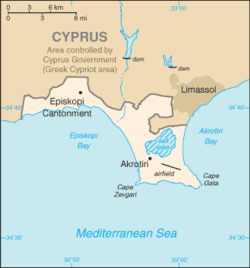
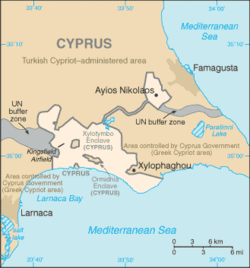
Akrotiri and Dhekelia cover 3% of the land area of Cyprus, a total of 254 km2 (98 sq mi) (split 123 km2 (47 sq mi) (48.5%) at Akrotiri and 131 km2 (51 sq mi) (51.5%) at Dhekelia). 60% of the land is privately owned as freeholds by Cypriot citizens; the other 40% is controlled by the Ministry of Defence as the Crown leasehold land.[39][40] In January 2014, an agreement between the Cypriot and UK governments was signed, ensuring that residents and property owners in the British Bases will enjoy equal rights for the development of property.[41] In addition to Akrotiri and Dhekelia, the Treaty of Establishment also provided for the continued use by the British Ministry of Defence and the British Armed Forces of certain facilities within the Republic of Cyprus, known as Retained Sites.
Akrotiri is located in the south of the island, near the city of Limassol (or Lemesos). Dhekelia is in the southeast, near Larnaca. Both areas include military bases, as well as farmland and some residential land. Akrotiri is surrounded by territory controlled by the Republic of Cyprus, but Dhekelia also borders on the United Nations (UN) buffer zone and the area controlled by the Turkish forces.
Ayia Napa lies to the east of Dhekelia. The villages of Xylotympou and Ormideia, also in the Republic of Cyprus, are enclaves surrounded by Dhekelia. The Dhekelia Power Station, divided by a British road into two parts, also belongs to the Republic of Cyprus. The northern part is an enclave, like the two villages, whereas the southern part is located by the sea, and therefore not an enclave, though it has no territorial waters of its own.
Territorial waters of 3 nautical miles (5.556 km) are claimed, and the right according to the laws of the UN to extend the claim of up to 12 nautical miles (22.224 km) is reserved.[42]
Wildlife and ecology
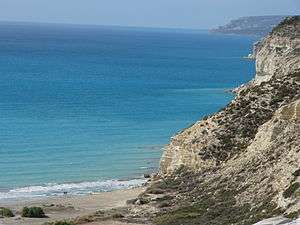
Cyprus is an important migration flyway for birds between Africa and Europe and millions of birds are killed yearly as they migrate over the island. To protect resident and migratory birds, BirdLife Cyprus and the RSPB survey areas of illegal trapping. More than 150 species of birds, over half of conservation concern, have been trapped in nets, or on limesticks, and it is estimated that organised crime gangs earn over 15 million Euros yearly. The dead birds are sold to provide the main ingredient for ambelopoulia in the Republic of Cyprus; an illegal delicacy served to restaurant diners. The 2015 survey estimated a maximum 19 km (12 mi) of mist nets across both the Republic and the British Territories, and more than 5,300 limesticks removed, mainly in the Republic. It is estimated that over 2 million birds were killed in 2015 including over 800,000 on British Territories.[43][44] Employing measures such as covert camera surveillance (including a drone), exclusion zones and impounding vehicles, trapping activity at Dhekelia fell by 77,5%. In 2016 an estimated 800,000 birds were killed at Dhekelia and in the following year trapping activity fell by 77,5% and bird deaths to an estimated 180,000.[45]
The beaches in the British Sovereign Base Areas (SBAs) are important nesting sites for the endangered green Chelonia mydas and loggerhead Caretta caretta turtles. The SBA Environment Department, assisted by a large volunteer effort, has monitored turtle nesting success on SBA beaches since 1990. Disturbance to nesting turtles is an issue in some areas due to activities such as camping, driving on beaches and illegal fishing. Sea turtles in Cyprus are protected as priority species under the Protection and Management of Nature and Wildlife Ordinance (implementing the provisions of the Habitats Directive), enacted in 2007.[46]
In December 2015, five Special Areas of Conservation (SACs) were designated in the Cyprus Sovereign Base Areas. The five SACs designated are Akrotiri, Episkopi, Cape Pyla, Dhekelia and Agios Nikolaos.[47] The designations were made under the Protection and Management of Nature and Wildlife Ordinance and will support the existing network (NATURA 2000) of SACs in Cyprus and across Europe.[48]
Demographics
When the areas were being established, the boundaries were deliberately drawn to avoid centres of population. Approximately 15,700 people live in the areas. About 7,700 native Cypriots work in the areas themselves, or on farmland within the boundaries of the areas. The British military and their families make up the rest of the population.[49]
Persons related to the territory may in theory be eligible to claim the British Overseas Territories citizenship (BOTC status) through a personal connection to the areas (i.e., birth on the territory before 1983, or born after 1983 to a parent who were born on the territory before 1983); but unlike most other British Overseas Territories, there is no provision in the 2002 amendment of the British Nationality Act 1981 by which British citizenship (with the right of abode in the United Kingdom) can either be claimed through automatic entitlement or be applied for by means of registration, from or through a sole personal connection to the Base Areas. (In comparison, the 2002 act bestowed British citizenship on all other BOTCs.) Hence non-British and non-military personnel with the connection to the territory can only live and work in the UK through their EU (Cypriot) citizenship and not through their BOTC status.
Under the terms of the 1960 agreement with Cyprus establishing the Sovereign Base Areas, the United Kingdom is committed not to use the areas for civilian purposes. This was stated in 2002 as the primary reason for the exclusion of the areas from the scope of the British Overseas Territories Act 2002. As of 2010, around 3,000 troops of British Forces Cyprus are based at Akrotiri and Dhekelia.
Education
Service Children's Education oversees education for children of personnel and MoD employees. The Eastern Sovereign Base Area is served by Dhekelia Primary School and Ayios Nikolaos Primary School, which are feeders for King Richard School. The Western Sovereign Base Area is served by Episkopi Primary School and Akrotiri Primary School, which are feeders for St. John's School.
Economy

No economic statistics are gathered for Akrotiri and Dhekelia. The main economic activities are the provision of services to the military, as well as limited agriculture. When the territory under the effective control of the Republic of Cyprus switched currencies from the Cypriot pound to the euro on 1 January 2008, Akrotiri and Dhekelia followed suit making the Sovereign Base Areas the only territory under British sovereignty to officially use the euro.[50]
Transport

Cypriot motorways pass through both areas. There is no public airport within the areas, but the RAF Akrotiri airbase is located there, which has a runway suitable for long-distance flights, but not used for public flights.
The Base Areas form part of the Republic of Cyprus telephone numbering plan, using the international prefix +357. Landline numbers are in the same eight-digit format, with the last four digits being the line number. Numbers in Dhekelia begin with the digits 2474,[51] while those in Akrotiri begin with the digits 2527.[52]
Communications
Postal services are provided by the British Forces Post Office, with mail to Akrotiri being addressed to BFPO 57[53] and mail to Dhekelia and Ayios Nikolaos being addressed to BFPO 58.[54] Cyprus Postal Services provides postal service for civilian homes and businesses within the Base Areas, then using Cypriot postal codes and "Cyprus" as country on letters from abroad.
The bases are issued different amateur radio call signs from the Republic of Cyprus. Amateur radio stations on the bases use the International Telecommunication Union prefix of "ZC4", which is assigned to Great Britain.[55] There are about 52 amateurs licensed in this manner. Amateur radio direction finding identified RAF Akrotiri as the location of the powerful but now defunct shortwave numbers station "Lincolnshire Poacher". Several curtain antennas there have been identified as being used for these transmissions.[56]
Culture
Media

BFBS Radio 1 and 2 are broadcast on FM and can be widely received across Cyprus. BFBS Television is now only available to entitled viewers via satellite, having been confined to the SBAs or encrypted in 1997 for copyright reasons,[57] before BFBS switched off its analogue transmitters in 2009.[58] The British East Mediterranean Relay Station is situated locally.
See also
- Index of Akrotiri and Dhekelia-related articles
- List of British Army installations
- List of British overseas territories
- Murder of Louise Jensen
- Sovereign Base Areas Customs
- United Nations Buffer Zone in Cyprus
- Overseas military bases of the United Kingdom
References
- "Akrotiri". The World Factbook. Central Intelligence Agency. Retrieved 20 September 2019.
- "British Nationality Act 1981 - SCHEDULE 6 British Overseas Territories". UK Government. September 2016.
- "The World's Five Military Empires". Big Think. 10 July 2017.
- Wald, Charles (4 December 2019). "Pull US Troops Out of Turkey: Former EUCOM Deputy". Breaking Defense. Retrieved 14 January 2020.
- Hazou, Elias (11 October 2018). "Anastasiades stays mum on 'secret' US base (Updated: adds former spy chief)". Cyprus Mail.
- "Cyprus Base Pipe Again Broken." Times [London, England] 2 August 1961: 10. The Times Digital Archive. Web. 29 December 2017
- OUR CORRESPONDENT. "Another Attack On Cyprus Pipeline." Times [London, England] 8 August 1961: 6. The Times Digital Archive. Web. 29 December 2017.
- "PRIO". prio-cyprus-displacement.net. Retrieved 24 March 2015.
- See UN photos of the refugee tents, and an account of the camp on the RAF Akrotiri website
- "PRIO". prio-cyprus-displacement.net. Retrieved 24 March 2015.
- See PRIO Centre report on Trachoni, and figures for housing units on Trachoni Village website Archived 13 March 2013 at the Wayback Machine
- See PRIO Centre report on Kolossi
- See Motor Vehicles and Road Traffic (Motorway and Speed Limits) Order 2008 for grid refs and street names for Trachoni, Kolossi and Achna Forest refugee settlements
- See map at Akrotiri Area Office page on SBA Administration website
- See map at Dhekelia Area Office page on SBA Administration website
- Jeffrey Richelson & Desmond Ball, The Ties the Bind: Intelligence Cooperation between the UKUSA Countries, Unwin Hyman, Boston/London and others, 1990, p.194 note 145.
- Schmid, Gerhard (11 July 2001). "On the existence of a global system for the interception of private and commercial communications (ECHELON interception system), (2001/2098(INI))" (pdf – 194 pages). European Parliament: Temporary Committee on the ECHELON Interception System. Retrieved 5 January 2013.
- "Treaty concerning the establishment of the Republic of Cyprus, with annexes and selected exchanges of notes" (PDF). Archived from the original (PDF) on 23 October 2014. Retrieved 16 June 2013.
- "SBAA website". sbaadministration.org. Archived from the original on 9 September 2012. Retrieved 10 October 2012.
- Treaty of Establishment, 1960, p.111-112, p.116
- "SBAA website". sbaadministration.org. Archived from the original on 13 September 2012. Retrieved 10 October 2012.
- "Defence minister visits British forces in Cyprus". GOV.UK. Retrieved 11 September 2014.
- The SBA Administration. "Sovereign Base Area - Court". sbaadministration.org. Retrieved 24 March 2015.
- Oliver, Jonathan; Smith, Michael (24 January 2010). "Officer Training Corps faces the axe". The Times. London. Archived from the original on 28 June 2011. Retrieved 23 April 2010.
- "Cyprus" (PDF), UK Parliamentary Statement, London, 15 December 2012, retrieved 24 March 2013
- "008.05.1347 Έκθεση κοινοβουλευτικής επιτροπής". www2.parliament.cy. Parliament of Ctorus. Retrieved 21 May 2020.
- "Situation of the inhabitants of the Sovereign Base Areas of Akrotiri and Dhekelia". www.assembly.coe.int. Parliamentary Assembly of the Council of Europe. Retrieved 21 May 2020.
- Great Britain Parliament House of Commons Foreign Affairs Committee (2008). Overseas Territories: Seventh Report of Session 2007-08, Vol. 2: Oral and Written Evidence. The Stationery Office. ISBN 978-0-215-52150-7. Retrieved 21 May 2020.
- "Bristol University website" (PDF). electric-fields.bris.ac.uk. Retrieved 10 October 2012.
- "SBAA website" (PDF). sbaadministration.org. Retrieved 10 October 2012.
- "Cyprus placed in the cross hairs of Syria mess". cyprus-mail.com. Retrieved 24 March 2015.
- "Cyprus will not play major role in any Syria strikes". cyprus-mail.com. Retrieved 24 March 2015.
- Is it possible to visit Akrotiri or Dhekelia, the British Sovereign Base Areas in Cyprus, as a tourist?
- SBA Customs and Immigration Travelling to Northern Cyprus
- "Brexit's obscure impacts: the borders of Cyprus". Eyes on Europe. Retrieved 10 October 2019.
- "Brexit: A view from Cyprus". Deutsche Welle. Retrieved 10 October 2019.
- "INFORMATION FROM EUROPEAN UNION INSTITUTIONS, BODIES, OFFICES AND AGENCIES" (PDF). eur-lex.europa.eu. Retrieved 3 February 2020. page 136
- Foreign, education ministries reassure Cypriots over Brexit - Cyprus Mail
- "House of Commons Hansard Written Answers for 08 Oct 2013 (pt 0001)". parliament.uk. Retrieved 24 March 2015.
- "Cyprus". theyworkforyou.com. Retrieved 24 March 2015.
- "'Historic' bases deal to boost development". cyprus-mail.com. 16 January 2014. Retrieved 24 March 2015.
- "Cyprus". Hansard. Parliament of the United Kingdom. Retrieved 25 March 2013.
- "RSPB Mass killing continues on British military base in Cyprus". BirdGuides. Archived from the original on 20 November 2016. Retrieved 16 March 2016.
- "Hundreds of thousands of birds still being illegally killed on British military base in Cyprus but annual increase halted". RSPB. Retrieved 16 March 2016.
- "Good news from Cyprus". Nature's Home. RSPB. Summer 2018. p. 40.
- Dr Phoebe Carter. "Sanctuary 40th anniversary edition: Around the regions - Cyprus Sovereign Base" (PDF). Sanctuary - The Ministry of Defence Sustainability Magazine, no.44, page 98. Retrieved 28 June 2016.
- "Five SACs designated in the British SBAs in Cyprus". BirdLife Cyprus. Archived from the original on 2 August 2016. Retrieved 28 June 2016.
- "Frequently Asked Questions on the designation of Special Areas of Conservation within the Sovereign Base Areas of Akrotiri and Dhekelia" (PDF). SBA Administration. Retrieved 28 June 2016.
- Akrotiri Population and Dhekelia Population. Retrieved 24 December 2013.
- Theodoulou, Michael. (27 December 2007). https://web.archive.org/web/20110510204604/http://www.timesonline.co.uk/tol/news/world/europe/article3097521.ece Euro reaches field that is for ever England], The Times. Retrieved 4 January 2008.
- "British forces overseas posting: Dhekelia, Cyprus". www.gov.uk. Retrieved 24 March 2015.
- "British Forces overseas posting: RAF Akrotiri, Cyprus". www.gov.uk. Retrieved 24 March 2015.
- "BFPO Indicator List BFPO Static Postcodes" (PDF). UK Government. Retrieved 3 January 2016.
- BFPO INDICATOR LIST STATIC BRITISH FORCES POST OFFICES
- Amateur Radio, Volume 59, Issues 1-6 "Steve Bowden, ZC4BX, recently returned to the UK after three years on Cyprus, where he initiated and managed the ZC4 award."
- "Lincolnshire Poacher". Numbers and Oddities. Retrieved 25 May 2008.
- BFBS pulls the plug on Larnaca viewers, Cyprus Mail 10 May 1998
- Screens go blank as BFBS TV switches off transmitters., Cyprus Mail, 8 January 2009
Further reading
- Fouskas, Vassilis K. (2003). Zones of Conflict: U.S. Foreign Policy in the Balkans and the Greater Middle East. Pluto Press. pp. 93, 111. ISBN 0-7453-2030-9.
External links
| Wikimedia Commons has media related to Akrotiri and Dhekelia. |
| Wikivoyage has a travel guide for Akrotiri and Dhekelia. |

- Sovereign Base Areas Administration web-pages
- BBC News – "UK offers to cede Cyprus land"
- BBC News – "Cyprus protesters clash at UK base"
- Cyprus Mail, Nathan Morley – "Mystery of Dhekelia Cemetery"
- Cyprus Mail, Nathan Morley – "Dhekelia at 60"
- "Akrotiri". The World Factbook. Central Intelligence Agency.
- "Dhekelia". The World Factbook. Central Intelligence Agency.
- The Princess Mary's Hospital RAF Akrotiri
- Cyprus Independence Agreement – Hansard Official UK Parliament Record
- James Rogers and Luis Simón. The Status and Location of the Military Installations of the Member States of the European Union and Their Potential Role for the European Security and Defence Policy (ESDP). Brussels: European Parliament, 2009. 25 pp.

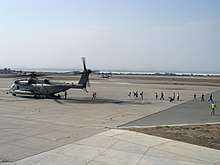
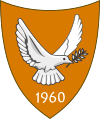
.svg.png)